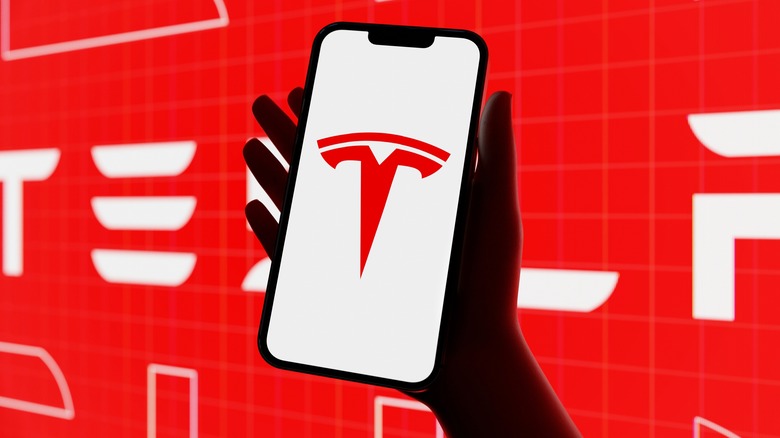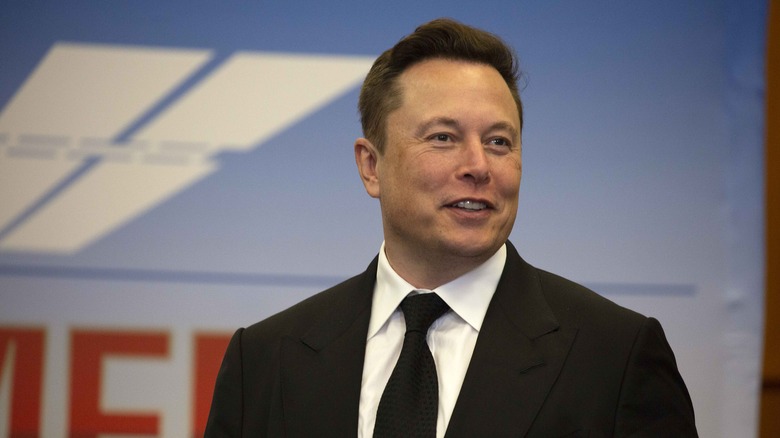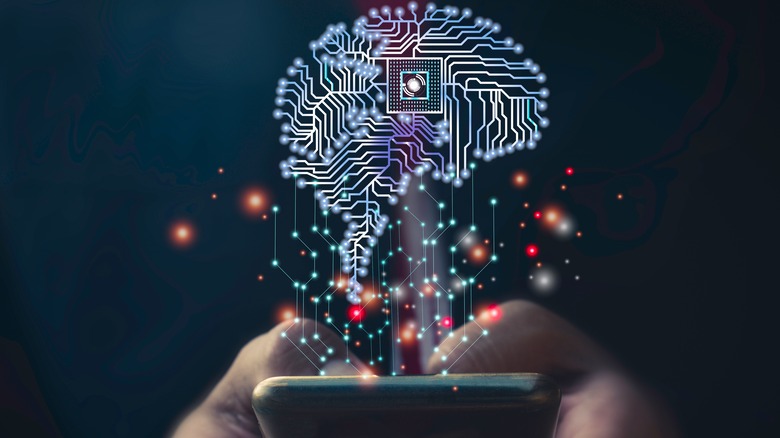Here's Why Elon Musk Says Tesla Will Never Build A Smartphone
The Tesla smartphone has been buzzing about in the rumor mill, but the thing is, its CEO Elon Musk already hinted at something much bigger. For a company that sold various phone accessories, one could assume making a smartphone is next on Tesla's to-do list, right? That's exactly what many rumors suggested with Tesla's upcoming smartphone allegedly called the "Pi Phone" (via Yahoo). A YouTube video concept showcases how this phone can connect to the internet using Starlink, navigate a Tesla, and even be controlled using its user's thoughts.
On top of all that, the phone is also said to come with night-vision cameras, solar charging, and crypto-mining capabilities as well. Now, if all that sounds too good to be true, that's because it is; the "Tesla Model Pi" phone was born out of unofficial renders created by ADR Studio Design. Although the Tesla phone apparently had a rumored 2022 release window, the source reported that most of these claims likely originated from "unofficial mockups" and baseless rumors that were circulating on YouTube and Twitter. So, does this mean hopes of a Tesla smartphone will never come to fruition?
Tesla phones are so last year
Nobody can say for sure if Tesla will ever consider making smartphones in the future, but Musk did address the issue. In a tweet, Musk said Tesla is "definitely not" actively developing any sort of smartphone, even referring to them as "yesterday's technology." Instead of focusing on legacy hardware such as phones, Musk did hint at something that he deems is "the future," and that's Neuralink. Some might be wondering, how can Neuralink, a company co-founded by Musk that develops advanced Brain Machine Interfaces (BMIs), be compared to something as mundane as smartphones? Well, let's just say Musk has big plans for these BMIs, which can be implanted in brains, allowing people to control computers with their minds in the process.
Like what the Tesla Phone concept shows above, its application can easily translate to mind-controlled smartphones, but with more emphasis on hardware that bridges the gap between people and their devices instead of the device itself. While that may sound too futuristic or far-fetched for some, Neuralink already gave a sneak peek of what it's like to play games using these BMIs. In a YouTube video, Neuralink showed a monkey playing "MindPong" using nothing but his mind. Interaction with the game is done simply by "imagining hand movements." This method led to a more precise performance, with the monkey constantly hitting the ball at will. Needless to say, users certainly won't be making any excuses about faulty controllers.
Don't bank on mind-controlled smartphones just yet
Physical hardware interfaces have always been a barrier that hinders humans from interacting with their devices more accurately. However, BMIs have the potential of unlocking that limitation, making man one with the machine, quite literally. While that may be a riveting notion for fans of the cyberpunk subculture, it's still too early for mass human application, let alone smartphone integration. Among Neuralink's long list of promising BMI applications, consumer-grade products are less of a priority than use in the medical field. In fact, helping quadriplegic people use computers will be the first thing Neuralink will be focusing on.
Musk claimed Neuralink's bleeding-edge brain implants could soon treat various medical conditions, from common memory loss to blindness and serious brain injuries. Of course, Neuralink still has a myriad of ethical and legal hurdles to overcome before its goals can be realized, especially since its controversial experiments had medical experts telling us they're fearing the worst. The question now is: Will Neuralink's BMIs move on to commercial use like in smartphones, if medical applications prove to be successful? It could be a possibility. After all, Neuralink already has at least $205 million on tap in investor funding (via Forbes). Just don't expect it to be a thing any time soon, at least not before we can all finally play some MindPong.


